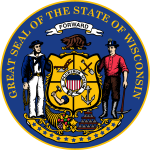| |||||||||||||||||
| |||||||||||||||||
 County results McCarthy: 50–60% 60–70% 70–80% 80–90% Fairfield: 50–60% 60–70% | |||||||||||||||||
| |||||||||||||||||
| Elections in Wisconsin |
|---|
 |
The 1952 United States Senate election in Wisconsin was held on November 4, 1952.
Contents
- Republican primary
- Candidates
- Results
- Democratic primary
- Candidates 2
- Results 2
- General election
- Candidates 3
- Results 3
- See also
- References
Incumbent Senator Joseph McCarthy was elected to a second term in office over Democrat Thomas E. Fairchild. McCarthy did not complete his term; he died on May 2, 1957, and was succeeded by William Proxmire in a special election.
As of 2024 [update] , this is the last time that a Republican has won the Class 1 Senate seat in Wisconsin.

